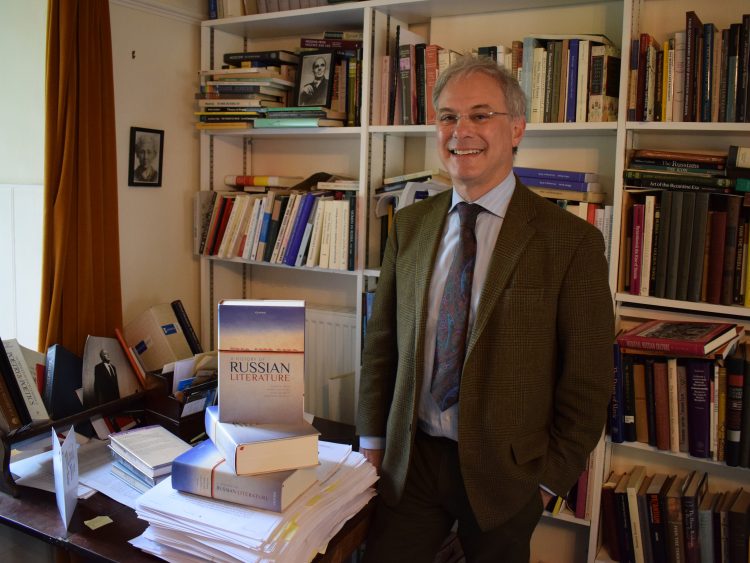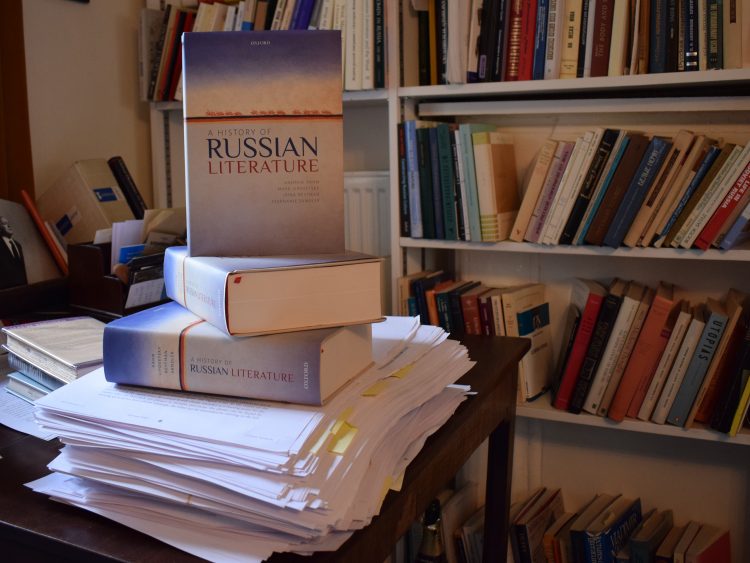A History of Russian Literature: an epic project for Andrew Kahn
29 May 2018

Professor Andrew Kahn, our tutor in Russian, recently celebrated the completion of an eight-year project when A History of Russian Literature was published by Oxford University Press. Andrew co-authored the book, which runs to 960 pages and spans the medieval period to the twenty-first century, with Mark Lipovetsky (University of Colorado-Boulder), Irina Reyfman (Columbia University) and Stephanie Sandler (Harvard University). Read on to find out more from Andrew about this impressive feat of scholarship and how it was put together.
How did the project come about?
The impulse for this new History of Literature was a conversation my wonderful colleague Stephanie Sandler and I had about the pluses and minuses of information/data overload – questions not only about reliability and utility of the information anyone can find on the web but about the challenge posed to seeing the bigger pictures. This seemed particularly acute in the discipline of Russian and in the post-Soviet space where there is the added factor of the huge amount of primary material that has become available since the early 1990s and an equally imposing amount of scholarship. We felt that a moment when the coherence and neutrality of literary histories were challenged from multiple theoretical vantage points as well as a moment when nearly all possible information seemed available to anyone with a WiFi connection offered a fascinating challenge: How to create a history of Russian literature that included information about sequence, individuals, and schools of thought but was more than a collection of facts? How to tell stories about Russian literature’s evolution that converged and revealed patterns of similarity, but which allowed vivid differences and points of rupture to show with equal power? At that point Stephanie and I sought out the other two co-authors, each a wonderful and leading scholar.
When did you start? And when did it stop being a ‘short’ history and turn into an epic?
Our conversations toward this book, on email, Skype and in person, began in 2009; Oxford University Press’s interest was apparent from the start. While you might not suspect it, given the size of our book, we started out originally to write quite a short book! We were encouraged by the original readers’ reports to go for greater breadth and depth, and we found that we enjoyed and ourselves learned a great deal by wandering into the peripheries of the tradition and by focusing, in our case studies, on specific works or phenomena at some length. Our excellent editor, Jacqueline Norton, tolerated and then encouraged our increasingly detailed proposals and allowed us multiple deadline extensions to write the much longer book that eventually resulted.

What is distinctive about this book?
Histories of Russian literature come in different shapes and sizes, and vary in their coverage of periods, balance between close reading and overview, and of course can also differ in essential questions of interpretation and implicit decisions about the canon. Our aim was never to try to render other works (like the classic history by Sviatopolk Mirsky) obsolete, indeed we give a history of these histories in our Introduction as a tribute to their enduring contributions and to show how these histories themselves become a part of the history of Russian literature.
Three features run through our book and give it its orientation. These aspects grew out of our own individual views and many shared discussions, which is why we emphasise: 1) the openness of Russian literature almost in all periods, from medieval to the present, to external influences, sometimes despite political barriers; 2) the function of storytelling in the literature itself and in a literary history; 3) a conviction that the place of poetry in the emergence of national narratives and in institutions of Russian culture merited rethinking and a new focus. On that last point, we sought to adjust a standard view that assumes that prose and poetry exist in binary relation to one another – that is, when prose is strong, poetry is weak and the converse. Drama is also featured in our history, inserting a third term between prose fiction and lyric or narrative poetry, but there are other interventions as well: visual material, which we often feature; documentary, memoir, or publicistic writing; and translations of many kinds.
The book was not conceived with a purpose such as advocating a specific view of the canon of Russian literature. There are many canons presented here! Our subject is Russia’s literary history, including many texts written in Russian but on other lands, and texts written by Russians but in other languages, and we consider the relationship to other national literatures as a history of productive cultural interaction. We do not argue for a specific set of national traditions so much as demonstrate that the creation of a set of shared national narratives is a constituent feature of Russian literature. What is now called the era of globalization is but a further stage of centuries of intense cultural interaction across national borders, and Russia has participated actively in these interactions despite periods or movements that emphasised isolation and difference. The fact is that no great national literature is sealed off from the rest of the world and the boundaries of Russian literature were always porous, whether the influence was proximate, as from the South Slavic lands or Poland, or distant, from Japan or the US. There’s an international quality built in that is often the subject of debate as the definition of a national literature gets discussed – think of all the French bashing that follows the constant imitation of French ways. We tried to chart these discussions in our book as well.
Our idea of how to write our history did evolve as we worked, although the basic framework did not change (a chronological structure overall but thematic organisation within each part; case studies and keywords as significant pauses in the historical narrative; and a unifying commitment to telling the stories of institutions, subjectivities, national narratives, and the intelligentsia rather than listing key facts in isolation from those stories). Points of emphasis changed as we worked, for example, when writers featured in a later period changed the way we wanted to present an earlier era. We added a more detailed account of the seventeenth century, for example, rather than folding it into the narrative of the pre-modern period, and we expanded greatly several sections in Part I because we wanted to show the enduring and formative influences of the Baroque, on one hand, and a genre like dukhovnye stikhi on the other.
Which sections did you write, and which is your favourite now?
Trade secret! The truth is that this was the most collaborative project imaginable at every stage, from the drafting and fine-tuning of the very detailed plan to all aspects of revision. The age of Dropbox has its benefits! Each author was also a critic and editor. Obviously, we broadly aimed to match expertise and interest with the assignment of the bigger parts of the narrative, and tended to work in pairs of a first drafter and then a second reader before all four of us scrutinised the result and sent it back with comments to the original author of those pages. Every part has something in it originally by each of us. As for favourite sections, I hope readers will find the case-studies enjoyable and useful (good for undergraduate essays, graduate seminar prep.!). One feature of the book is its ample coverage of the medieval and the seventeenth century or early modern. I particularly love the early modern writers – the literature is full of formal innovation, interesting ritual occasion, and also highly individual voices.
A round-table discussion and reception will take place at the Harriman Institute, Columbia University on 12 October. Aularian Russianists in the area (and there are some!) are most welcome to attend (and grill their former tutor!).
Categories
Related News

Teddy Hall’s Professor Carly Howett’s Research Suggests Saturn’s Icy Moon May Host Life
10 Nov 2025
